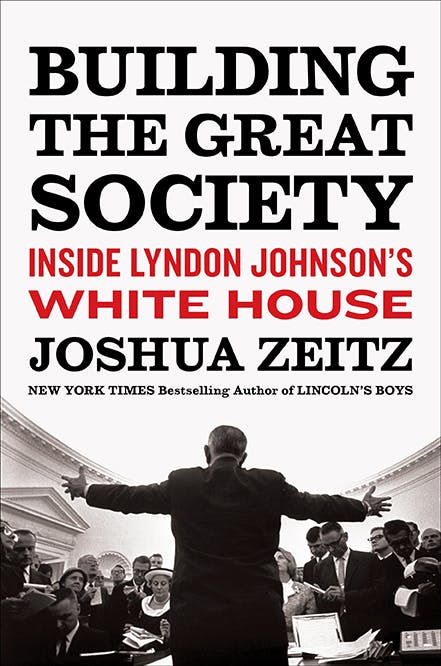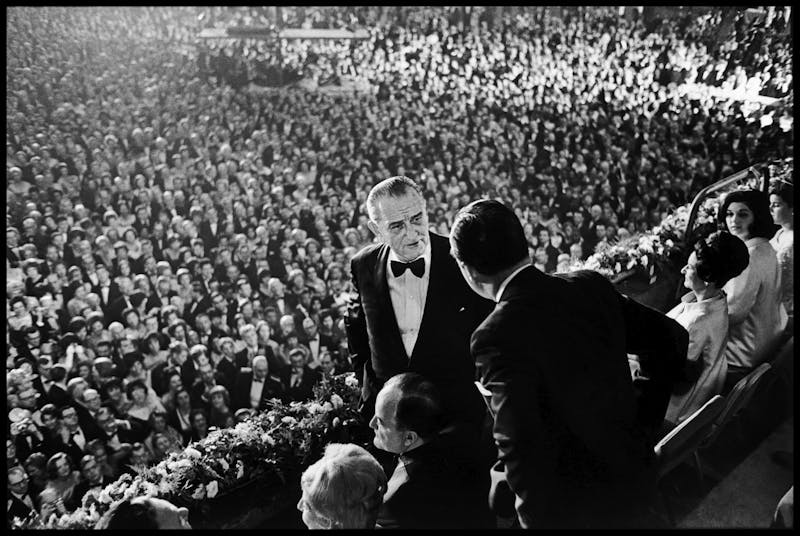American liberals might view the presidency of Lyndon Baines Johnson as a modern version of the Icarus myth. On the wings of huge Democratic majorities in Congress and his own ferocious ambition, LBJ signed into law more extensive and progressive reforms than any president in history save Franklin D. Roosevelt, his quasi-paternal model for mastery both at home and abroad. To mention just the highlights of the Great Society requires a rather lengthy sentence: the Civil Rights, Voting Rights, and Fair Housing acts; Medicare and Medicaid; federal aid to schools and colleges; a complete overhaul of the discriminatory immigration law; Head Start; environmental protection; creation of the National Endowment for the Humanities, the National Endowment for the Arts, and public broadcasting—and, perhaps most remarkably, both a vow to abolish poverty and a modest program to launch that utopian mission.
Yet by the fall of 1966, the Great Society was beginning its plummet to earth. Attacks from right and left had cut deeply into Johnson’s popularity, which at the start of his tenure in 1963 had risen as high as 75 percent. The right responded to anti-racist legislation with fears about black crime and militancy, while the left protested vehemently against the escalation of the war in Vietnam. Less than two years later, Johnson, always as insecure as he was aggressive, announced he would not run for reelection in a contest he feared he would lose. Liberals have never soared so high again.
This oft-told story has the power to reassure as well as to demoralize. Fifty years later, one may doubt whether America will ever see a surge of progressive lawmaking like this again. Yet if liberal politicians can stay inside the boundaries of the politically possible and avoid making promises they cannot keep, LBJ’s example suggests, then they have a decent chance of vanquishing the right, if not of utterly transforming American society. But was LBJ’s hubris the main reason the Great Society had such a thrilling rise and such a rapid fall? To explain a historical shift so momentous, one has to look further than the flaws of the individuals who participated in it, to the state of the country and its place in the world.
In his new book, Building the Great Society, Joshua Zeitz is content to refresh the familiar narrative that LBJ’s failures and successes were largely born of personality. What he adds is a tight, mostly admiring focus on the indispensable labors of the talented staffers and advisers who served the president. To a man (and all were male), they were, according to Zeitz, “as pragmatic as Johnson himself—attuned to the workings of political power, skilled in the art of throwing a sharp elbow or building an administrative empire, and hungry for position and prominence.” Some of those he describes—Bill Moyers, Richard Goodwin, and Daniel Patrick Moynihan—are known to anyone who cares about the history of the period. Others, like Horace Busby and George Reedy, did just as much to shape legislation and assure its passage but have barely rated a mention in other studies of the Johnson presidency.
Zeitz argues that the neglected figures tended to be realists. Idealists like Moyers and Goodwin wanted to move as far and fast toward creating a racially egalitarian, essentially social-democratic order as the president and Congress would allow. Others, like Busby, who had been at LBJ’s side since his days as a representative from Dixie and then as a risk-averse leader of the Senate, cautioned against making promises, such as ending poverty, that the administration could not possibly deliver. “The politics of the extremes is what the typical American expects you to break away from,” Busby told his boss a month after he became president. “If you can do so, you can broaden the Democratic Party base as it has not been broadened in two decades.” Zeitz credits the sober-minded aide with understanding that a “liberalism grounded in identity politics would be the undoing of the Democratic majority.” As it turned out, broad-based policies such as Medicare and Medicaid did more than the anti-poverty program itself to improve the lives of poor Americans.
Johnson and his aides did their best work in 1965, following his blowout victory over Barry Goldwater. Larry O’Brien, a Kennedy holdover who served LBJ as a legislative liaison, lobbied Congress shrewdly and relentlessly, helped by the fact that LBJ refused to take a lawmaker’s no for his or her final answer. After Medicare passed, the heads of government agencies tasked thousands of bureaucrats with getting senior citizens to sign up and physicians to agree to care for them. That spring, just after police brutally attacked the nonviolent march for voting rights in Selma, Alabama, Richard Goodwin wrote the speech LBJ delivered to a joint session of Congress, capturing the moral gravity of the moment: “Their cause must be our cause, too. Because it’s not just Negroes, but really it’s all of us who must overcome the crippling legacy of bigotry and injustice. And we shall overcome.” When Congress easily passed the Voting Rights Act four months later, to bring true democracy to the South for the first time since the end of Reconstruction, hubris appeared more like courage.
A talented journalist who also holds a Ph.D. in history, Zeitz draws creatively on memoirs and White House documents. His tales, while seldom original, zip along with style. Yet, in his close attention to what the men inside the White House thought and did, Zeitz scants the larger reasons for their success and eventual downfall. Lyndon Johnson took over the presidency at the zenith of both the nation’s prosperity and its global power. The economy had been growing at an extraordinary 6 percent a year, and, thanks to strong unions, wages kept pace with profits. Even conservatives could not argue credibly that the nation wasn’t rich enough to finance expansions of the liberal state. Then, with the nomination of Barry Goldwater, the Republicans ran a candidate for president whom its sizable moderate wing despised. In the election of 1964, liberals took control of Congress for the first time since the 1938 midterms. And unlike their New Deal progenitors, these liberals believed in advancing equal rights for Americans of all races.

Johnson and his aides were certainly adept at the legislative arts. But with their party commanding two-thirds margins in both houses of the 89th Congress, which met in 1965 and 1966, they could have been less adroit and still enacted a large chunk of their reform agenda. During the summer of 1965, I was interning for a liberal lobbying outfit in Washington. Watching from the House and Senate galleries as Democratic bills came up for votes felt like seeing good major league hitters competing against high school pitchers. It was not a real contest.
LBJ’s time in office also coincided with the mighty wave of black freedom activism that had begun to gather strength during World War II. As Democrats started to shed their racist traditions, their policies on civil rights and the poor met with a strong white backlash. Congress enacted the landmark measures that crippled Jim Crow at about the same time as the initiation of the anti-poverty program. The latter was widely perceived as a massive handout to black people, a misconception that conservatives were quite happy to exploit.
In fact, the funds committed to the program were far from massive. The original appropriation for the Office of Economic Opportunity, the new agency that coordinated the program, was a paltry $800 million. Nor were the funds directed mainly at black people: As Zeitz makes clear, the program was actually designed as a way for poor people of all races to build institutions to help themselves, with modest help from the federal government. But urban politicians, most of them fellow Democrats, did not like the way the OEO changed the balance of power in their districts. The OEO emboldened activists to improve city services without needing to appeal to local politicians for federal funds—which they’d previously doled out in return for loyalty at election time. “We are experiencing a class struggle in the traditional Karl Marx style,” one Syracuse official bristled, “and I do not like it.”
Ironically, the most popular and enduring achievements of the Great Society had no mass movement behind them and ended up being the most costly of all. Policy experts and liberal congressmen had long advocated plans for what became Medicare and Medicaid. The AFL-CIO lobbied hard for the legislation and successfully beat back resistance from the American Medical Association. But no one marched on Washington or other cities to demand that the government cover the health care expenses of millions of Americans.
The contrast should be obvious: When government gives most Americans what they want and need, few care about the ideological motivations behind it. But when liberal Democrats are viewed as favoring a racial minority, particularly an “ungrateful” one, at the expense of the white majority, they court electoral disaster. To his everlasting credit, LBJ understood the political risks of championing both civil rights and an end to poverty but chose to act morally anyway, betting that the loss of the white South would not end his party’s hold on power.
Perhaps he would have won that wager, if he had not turned the Vietnamese civil war into a test of American “resolve” in the global conflict with communism. Zeitz quotes one of Johnson’s typically crude rationales for hurling thousands of lives and billions of dollars into the debacle of Indochina: “If I don’t go in now, and they show later that I should have, they’ll push … Vietnam up my ass every time.”

That LBJ worried mainly about what hawks at home would think of him reveals his assumption that the United States could have its way in the Third World whenever its leaders chose to make the effort. After all, its proxy forces had put the Shah back in power in Iran and toppled a head of state in Guatemala, when he sought to expropriate lands belonging to the United Fruit Company. And in the spring of 1965, Johnson dispatched 22,000 troops to the Dominican Republic, where they stopped a left-wing former president from returning to power. How could North Vietnam, which the president famously dismissed as a “raggedy-assed, little fourth-rate country,” defeat a force equipped with the most abundant and advanced arsenal on the planet? Somehow, the stalemate in Korea a little over a decade before had fallen into a memory hole.
The Great Society at home was rooted in confidence that the United States would continue to dominate the international economy, and its military supremacy would endure into the indefinite future. It mattered, of course, that LBJ had a talented and loyal staff to help him enact far-reaching policies to improve the lives of most Americans. But his foreign policy and Pentagon teams, headed by Dean Rusk and Robert McNamara, seemed just as capable and dedicated until their rosy assessment of the war in Vietnam made them look like fools—and fools willing to countenance the bloody devastation of an entire country at that.
Historians with a more analytical bent than Zeitz maintain that the legislative victories of the Johnson years represent an anomaly in America’s political culture, which is typically dominated by corporations and politicians hostile to even modest redistributions of wealth and power to workers and the poor. For Julian Zelizer, it was only LBJ’s good fortune in having Goldwater as his opponent “that created unusually good conditions in Congress for passing domestic bills.” For Jefferson Cowie, the “great exception” of the New Deal and Great Society depended critically on solid backing from white working-class voters. The anti-poverty program coupled with the Immigration Act of 1965 unintentionally eroded that base. The “Reagan revolution,” writes Cowie, was simply a “restoration” of the individualism that had been the norm in governance before the Great Depression and the early decades of the Cold War. He does not abandon hope for another age of bold reform. But neither, he warns, should one ignore the reality that FDR and LBJ presided over “an extraordinarily unique period in American history.”
I take a more sanguine view. Despite the brevity of the Great Society, many of its key achievements endure. The Civil Rights Act helped countless African Americans, Latinos, and women of all races to secure a higher education and a middle-class job. The GOP Congress may want to strip medical benefits away from the elderly and the poor. But if they succeed in doing so, they will almost surely suffer at the polls. And despite Trump’s bigoted tweets and rants, he cannot stop the United States from becoming, over the next few decades, a society with no majority race or ethnic group.
The American taste for individualism will continue to frustrate the hopes of liberals and their sometime leftist allies. But the classic paradox that political scientists Lloyd Free and Hadley Cantril identified during the heyday of the Great Society still holds: Most Americans are “ideological conservatives but operational liberals.” Americans hate “big government,” but they adore state and federal spending—as long as it benefits them and anyone else they regard as deserving that aid: particularly senior citizens, children, and veterans.
In politics, to refrain from advocating bold reforms is as perilous a strategy as promising what you will never be able to achieve. Icarus’s father warned him not to fly so low that the waters of the Mediterranean would dampen his wings and cast him into the sea. Caution will not lift Democrats into a position where they can launch a new era of egalitarian change. But it would certainly help if they had the good fortune to run against candidates with popular ratings as low as Barry Goldwater’s in 1964.
